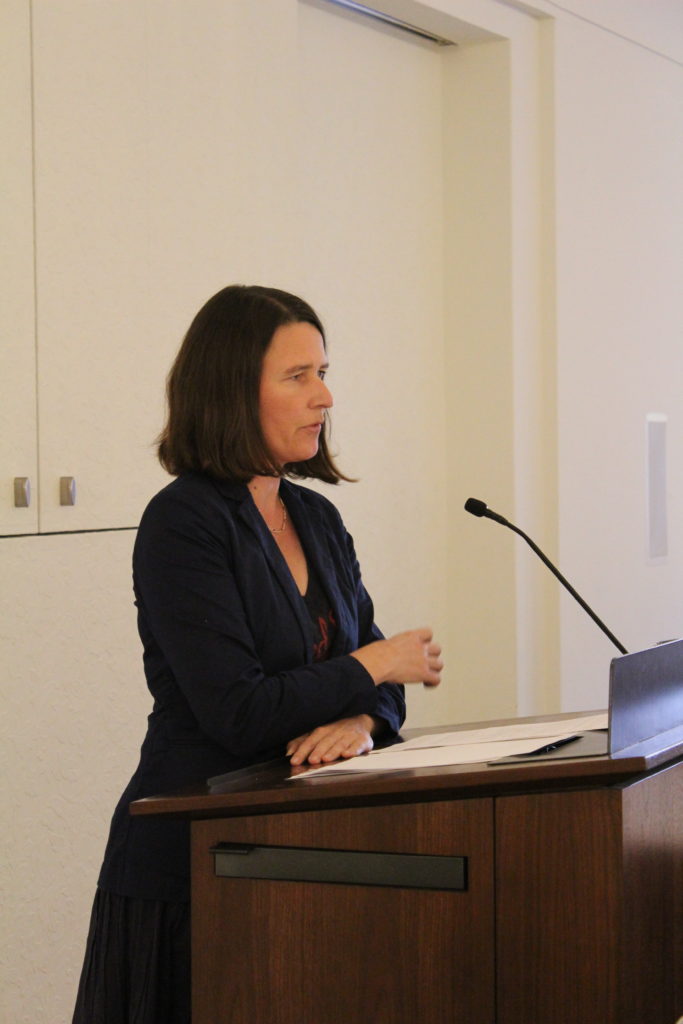
The Exploitation Bias in the Transnational Law of Natural Resource Extraction
- Isabel Feichtner Assistant Professor of Law and Economics, Goethe University, Frankfurt
The second lecture in the colloquium broadened the lens to examine how trade, investment and monetary regulation impact on natural resource extraction and governance. Isabel Feichtner, an Assistant Professor of Law and Economic at Goethe University in Frankfurt, Germany presented a lecture “The Exploitation Bias in the Transnational Law of Natural Resource Extraction.”
Feichtner highlighted the important role that lawyers can play in analyzing and transforming the global political economy of resource extraction to make it less exploitative of natural resources. She suggested that perhaps the most promising path to reform, was through financial institutions, rather than human rights or traditional democratic institutions. Feichtner also emphasized the importance of bridging the gap between public and private international law, and between domestic and international law.
Feichtner emphasized that lawyers have a unique perspective to bring to the study of political economy because of their ability to understand the many legal processes that determine natural resource governance outcomes. Additionally, legal training provides a strong capability to analyze institutions with complex and contradictory aims.
“Natural Resource extraction gives rise to many folded distribution conflicts. They concern questions such as: should nature be turned into commodities through extraction, which resources should be extracted and by whom and where, who should bear the costs and who should bear the benefits from resource extraction?”
Feichtner took care to place today’s natural resource conflicts in a historical context. As natural resources are unevenly geographically distributed, the post-colonial resources conflicts emerged between resource-exporting and resource-importing states. Following decolonization former colonies asserted their permanent sovereignty over natural resources in international forums, as part of a broader call for a more fair and equitable international economic order. Resource-exporting states also sought to establish international commodity agreement to stabilize prices of raw materials. There was strong resistance to such calls for reform from politically-powerful nations, most notably the United States. In response, conflict over access to resources increasingly moved from political spaces and instead was entrusted to the market, narrowing the possibilities for international political contestation about adverse distributive consequences of resource extraction.
In suggesting possible ways forward, Feichtner pointed to the legal framework of money and public finance. She suggested that reform and democratization of money could lessen the emphasis on extraction and profit.
David Adelman, the Harry Reasoner Regents Chair in Law at the University of Texas School of Law, responded to the talk. Adelman raised the question of whether the privatization and marketization of resource governance and extraction relieved developed countries of their responsibilities to cooperate with developing countries. He also pointed to shifting international dynamics, such as the near monopoly that China has on rare earth materials essential for many renewable technologies, such as turbines, solar panels, and batteries. He stressed the need to be alert to changes in the international political economy of resource governance, especially in the shift to a “green economy.”
Members of the audience reacted to Feichtner’s presentation positively, and were particularly impressed with her call to action for human right’s lawyers and advocates to move beyond their legal training to familiarize themselves with other disciplines, such as economics, in order to better examine questions of political economy. One student noted that the call was daunting, but important for human rights advocates to heed.
Respondents
- David Adelman Harry Reasoner Regents Chair in Law University of Texas School of Law
